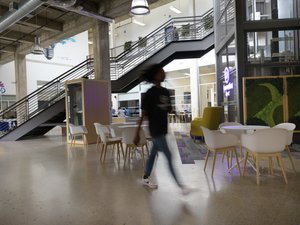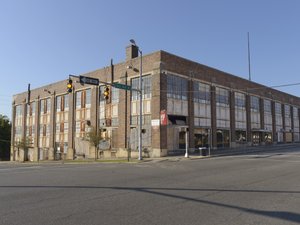Innovation Depot is a powerhouse of a tech accelerator and incubator nestled between Birmingham’s financial district and the University of Alabama at Birmingham where it is home to over 100 young companies that employ more than 1,500 people.
And changes are on the horizon, according to CEO Brooke Gillis.
Voltage, the depot’s six-week idea-stage accelerator, will now be run by local startup AppThink. The partnership aims to provide an accessible path to success for entrepreneurs, according to AppThink CEO Kellie Clark.
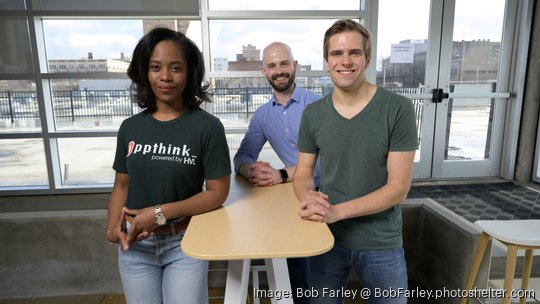
“We’re committed to helping the organizations that serve founders (and) create success stories, and we’re passionate about investing in founders located in emerging ecosystems worldwide, but first, we’re doing it in the ecosystem we love and believe in most — Birmingham,” Clark said.
While AppThink will not recruit for the program, it will facilitate and lead Voltage. Gillis said plans are also in the works to expand the program.
Another local accelerator, Techstars, will relocate from the Denham building to the depot at the beginning of May. It will run its next cohort in September out of the startup incubator.
“The reason why we want to have accelerators in this building ... is because being an entrepreneur is very lonely,” Gillis said. “And so what happens is you go to these 13-week accelerators, and you’re surrounded by amazing, like-minded individuals (who) are all kind of sharing one common goal, but then the accelerator’s over. It can be a very lonely place.”
Gillis wants accelerator participants to know there is a place for them at the depot where they can foster a network and collaborate with peers. She added that the depot will also refine its focus when it comes to incubating entrepreneurs by getting back to “grassroots.”
“What that means is that we want to align with every single stage of (a member’s) journey, and how we’re going to do that is to make sure that we’re offering resources at every stage,” Gillis said.
A resource database will be created with access to marketing, capital, tax-preparing resources and more.
“We don’t just want to be here to rent space out,” Gillis said. “We want to actually be a true incubator and track their progress throughout their journey.”
When it comes to startups that are further along in their journey, Gillis said a new partnership with the Nextec building, located at 1524 Third Ave. N., will provide graduates of the depot with a place to go next. Gillis said the Nextec building’s proximity to the depot will allow graduate companies to remain a part of the ecosystem.
“For so long, we were at 100% occupancy and we weren’t able to allow any new great companies in the building because our capacity was full,” Gillis said. “And so we’ve already graduated some companies out of the depot in the past few months over to the Nextec building or to their own their own brick-and-mortar buildings. We’re looking to continue to do that as people progress to leave room for other people to come in.”
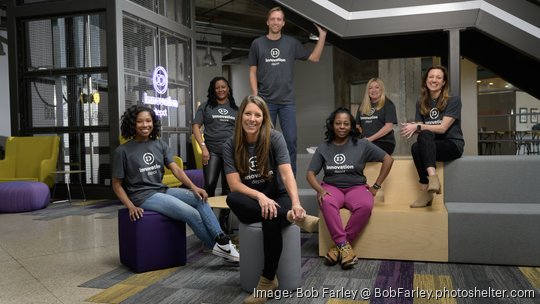
Patrick J. Murphy, director of the UAB J. Frank Barefield Jr. Entrepreneurship Program and Goodrich Entrepreneurship Chair, is familiar with incubators and built his career in an environment surrounded by them. He has worked out of 1871, Chicago’s flagship incubator, and several other entrepreneurship hubs, centers and incubators in Chicago.
Murphy said making way for new companies is an important consideration.
“As our entrepreneurial ecosystem grows and becomes more healthy and active, Innovation Depot will need to think carefully about a formal strategy for encouraging the established businesses to move out so that it will make space for the less-established businesses to move in,” Murphy said, suggesting a graduated rental rate scheme as one option.
Because facilitating these changes will take up much of the depot staff’s time, it also recently named its first property manager, Graham & Co. The transition to its management started in January and wrapped up in February.
Graham & Co. will oversee the leasing process for new member companies as well as building maintenance and monthly billing, a move that Gillis said will free up staff to offer more support to member companies.
“We’re not trying to do it all, but we’re leaning on people that are doing it really well,” Gillis said. “We’re leaning on AppThink, we’re leaning on Graham & Co., we’re inviting accelerators like Techstars into our building to really surround ourselves with everyone in this ecosystem and try to just help each other and all work together.”
A place to be seen
Depot members like Tevin Harrell are already feeling the impacts of these changes.
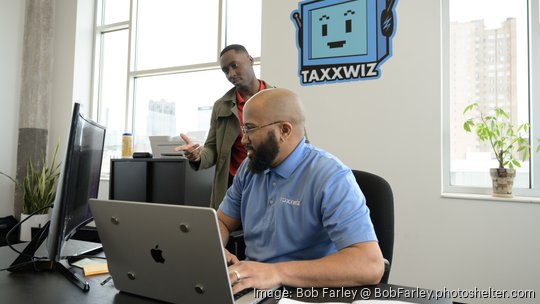
Harrell is founder and CEO of Innovation Depot-based company TaxxWiz, which recently created one of only 15 approved IRS tax softwares.
Having been in the depot for two years, Harrell said the collaboration, relationships, resources and affordable space have been the highlights. He also appreciates Gillis’ move to graduate older companies to make way for new ones.
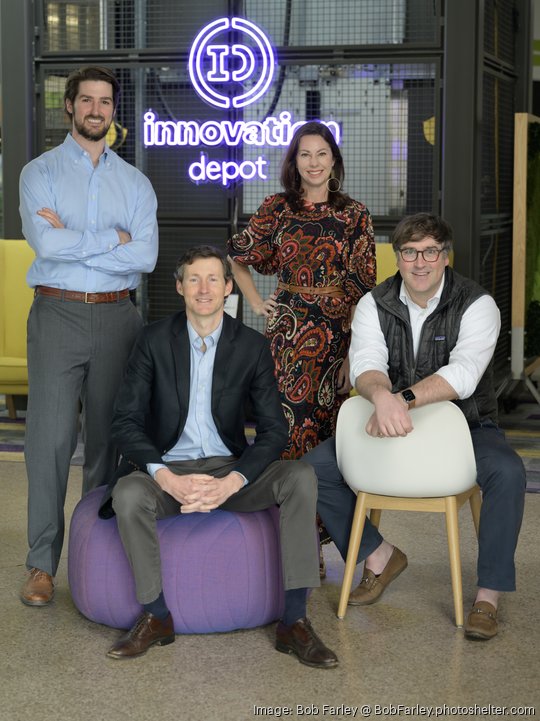
John Peinhardt, who has been in the depot for about seven years with two companies companies and is co-founder and CEO of Strategypoint, said he values the energy, being surrounded by creative and passionate people and the month-to-month flexibility of the space.
Mike Mahon, co-founder and CFO of Strategypoint, highlighted the mix of formal and informal connections to be made within the incubator.
“It’s also a great energy for a post-Covid environment,” Mahon said. “ ... Every single commercial office space in America became very quiet overnight in March 2020, and now, the energy level of the depot is a lot higher as people come back to offices, and the energy level at the depot is a lot higher because Brooke is a great high-energy leader.”
Anne Randall, VP of experience at Startegypoint, has been at three companies within Innovation Depot.
“I think it’s a place to be seen,” Randall said of the incubator. “ ... The city of Birmingham is going to walk by within a week. You’re going to see the mayor. You’re going to see special events. The movers and shakers of Birmingham are either working or hanging out or having meetings.”
The Strategypoint leaders said they’d like to see more celebrations within the depot.
“If we have more celebrations, we have more shared space, then that would create a lot more of the informal bump-ins, the informal connections that I think have been envisioned from the start of the depot,” Mahon said.
And a key player among those connections is UAB, which has been an integral part of Innovation Depot’s history and has continued its support and partnership with the incubator over the years.
Dr. Ray Watts, UAB president, is optimistic about the future of the depot.
“We believe very strongly in having a vigorous incubator, and it has been focused on digital technology and other technologies influencing health and quality of life. We’ve continued to be a real partner and several of our key leaders are on the Innovation Depot board of directors, including myself. We’re excited about the future for them,” Watts said, adding that he envisions eventually building an “innovation district” around the depot.
Charting the uncharted
The depot wasn’t always the vibrant entrepreneurial hub that it is today, however.
A long journey filled the timeframe from the 1980s, when the predecessor to the depot was founded, to its recognition now as one of the crowning jewels of innovation and entrepreneurship in the Magic City.
One of the predecessors to the depot was a UAB business incubator called the Office for the Advancement of Developing Industries. It was born during a time that the depot’s founding CEO, Susan Matlock, said the concept of business incubation was relatively uncharted territory.
Matlock spearheaded the incubators’ move to the 140,000-square-foot old Sears building, located at 1500 First Ave., N. after the building had been vacant for two decades. When the building opened in 1941, the facility was hailed as the largest single-floor department store in the United States. It was renovated in 2006 and welcomed its first tenants in 2007.
Murphy called Matlock a visionary.
“This realization of how important growing your own locally was sort of became more of a focus in about the late ’80s,” Matlock said. “ ... And so, the whole purpose of business incubation was to co-locate so you could provide services. The fundamental purpose of business incubation was to encourage success and successful business development, and so it was in the best interest of the community to figure out ways to do that.
“The purpose was never to offer free space or even the cheapest space. The purpose was to be able to provide services through co-location and the most important element on the physical side was the flexibility.”
Innovation Depot was a more than $17 million project, with funders including UAB; the Birmingham regional business community, including many leading private foundations; the city of Birmingham and Jefferson County. Matlock called the money the biggest challenge in launching the depot with more than $14 million being borrowed.
Due to the timing of the Great Recession of 2008, she said filling the building was initially a slow process.
“We had that big old parking lot,” Matlock said. “There were very few people there. And then it reached a point by the time I retired (in 2014) where the parking lot was totally packed, and we had to lease some parking spaces from across the street in order to be able to accommodate. I think there were nearly 1,000 people working out of that building.”
As the depot worked to grow and support the development of emerging technology, biotechnology and life science businesses, it became an increasingly popular destination for young entrepreneurs.
When Murphy was building the Barefield Entrepreneurship Program, he made it a priority to establish an intentional program presence in the depot.
Some of the depot’s greatest strategic advantages, Murphy said, are its location, size and proximity to UAB. Being located in the heat of an urban center is unusual for a large incubator, where housing an similar-sized incubator as the depot would be cost prohibitive in many other cities.
But despite the depot’s size, Murphy said an “Innovation Depot Two” is needed.
“I believe we do have the capacity here to put up more co-working spaces, because entrepreneurs seek opportunities as part of their day-to-day activities, and they’re always looking for places to go,” Murphy said, adding that bringing a younger population of upwardly-mobile professionals together leads to entrepreneurial outcomes.
“If we have a greater capacity in terms of our entrepreneurial, co-working innovation hubs to house them and support them, that’s where they’re going to focus their energy and their work. And so I think connecting those dots is key to the development of our ecosystem,” Murphy said.
When entrepreneurs are trying to start their business, they don’t just look locally, he added. They look nationally.
“They look at other cities, and they try to get a really good sense of what those ecosystems are like, and when you have thriving, growing robust ecosystems, sometimes those environments are very hard to enter for startup entrepreneurs. The barriers to entry, whether it’s cost, or culture or saturation in a particular industry, that will make an entrepreneur decide not to go there,” Murphy said. “But if one looks at a city like Birmingham and sees ample co-working space which is affordable and furnished well and, in terms of the community and the culture, is healthy, and welcoming and supportive then they will move here from Chicago or Nashville or Knoxville or Austin or Dallas or Seattle or different places where quite frankly, it’s a little bit harder for a startup entrepreneurial venture to support itself.”
The depot’s biggest weakness, Murphy said, is its programming, which he views as an opportunity.
“We need more accessible exciting, relevant, valuable programs for the community members here,” Murphy said. “These could be educational programs. These could be networking activities. These could be partnership-oriented programs. These could be competitive programs and have awards and other kinds of support built into them.”
Another area with room for improvement, Murphy said, is the depot’s strategic relationship with UAB. Matlock agrees there is room for improvement in an incubator the size of the depot, but said she is satisfied with its progress.
Potential realized
It is difficult to overstate the impact of the depot today.
Successful depot graduates include companies such as Theranest, which sold for over $1 billion; Fleetio and Pack Health. Shegun Otulana, Tony Summerville, Nate Schmidt and Gillis, some of the biggest contributors to the local entrepreneurial ecosystem, all shared a set of offices together in the depot, despite working for three different companies.
Going forward, Josh Girvin, chair of the Innovation Depot Board of Directors, emphasized renewed support for the incubator.
Girvin said the Board’s new vision includes expanding the depot’s intentional outreach to traditionally underrepresented entrepreneurs, among other initiatives.
Ultimately, Matlock believes the depot has achieved what it was founded to do.
“It has been in spite of some real big challenges, but they’re no different than the challenges that any business faces. I mean, you’re going to be in a position where you’ve got to refocus from time to time. You’re going to be in a position where you’ve got to raise money. You’ve got to protect your foundation. So it’s evolved over time,” she said, adding that, even still, the core mission of supporting emerging businesses has not changed.
Matlock said she is not surprised that the Birmingham startup community has reached the heights it has, and the depot, she said, has delivered in the Birmingham community, fueling an increase in entrepreneurial activity and serving as a model of the Magic City achieving impactful goals.
“Anytime you hear that we can’t do this or we can’t do that, to me, Innovation Depot is proof that yes, you can,” she said.
As for the future of the depot, Matlock wants to see it continue to provide support to young entrepreneurs taking big risks and produce successful graduates.
“I think in the community, sometimes there would be a tendency to think of it as ‘that incubator down the street.’ And that’s not what it is at all. It is an incubation center, which is different than a building,” Matlock said. “It’s always been more than a building ... If you look at the overall community now, we’re so much more focused on success, especially in technology and entrepreneurship, and I think that’s going to take this community into the future.”
Timeline
1983- Office for the Advancement of Developing Industries founded
2003- Plans for old Sears building began development
2006- Old Sears building purchased and renovated
2007- Old Sears building welcomes first tenants after two-decade vacancy
2008- Office for the Advancement of Developing Industries joins the Entrepreneurial Center to officially form Innovation Depot
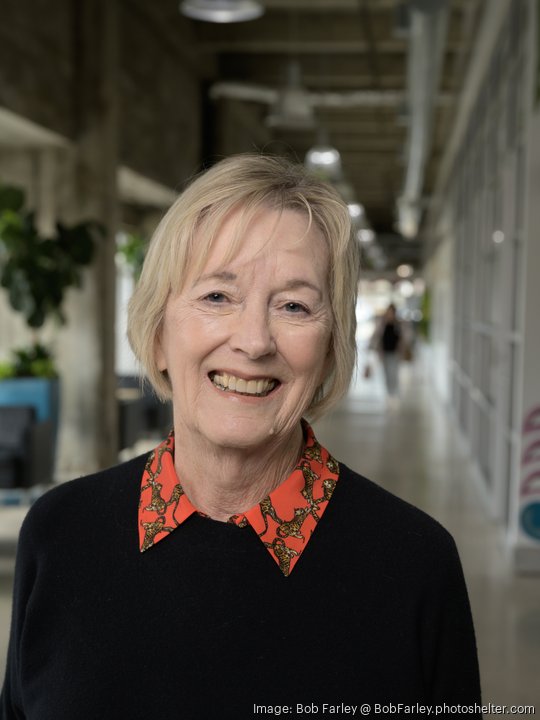
2014- Susan Matlock retires as CEO of Innovation Depot, Devon Laney becomes CEO
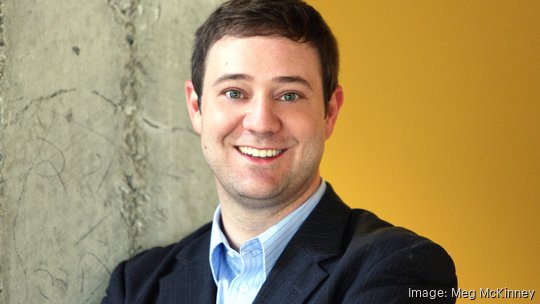
Sept. 2019- Devon Laney leaves CEO role
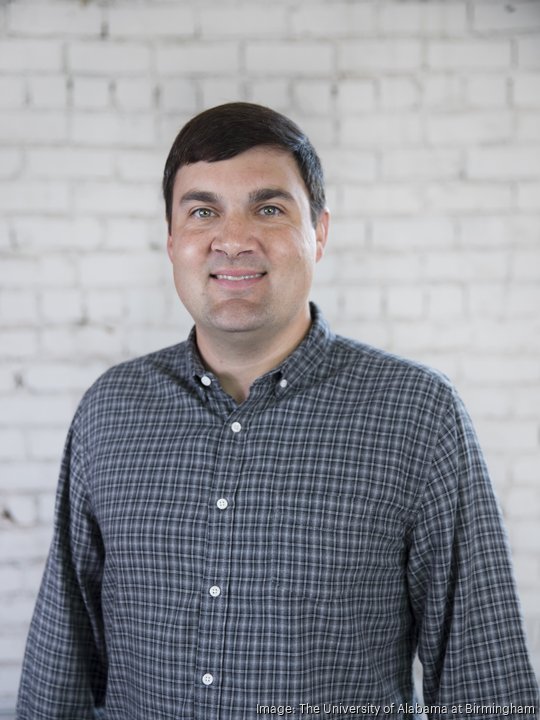
April 2020- Drew Honeycutt becomes CEO
Aug. 2022- Drew Honeycutt leaves CEO role
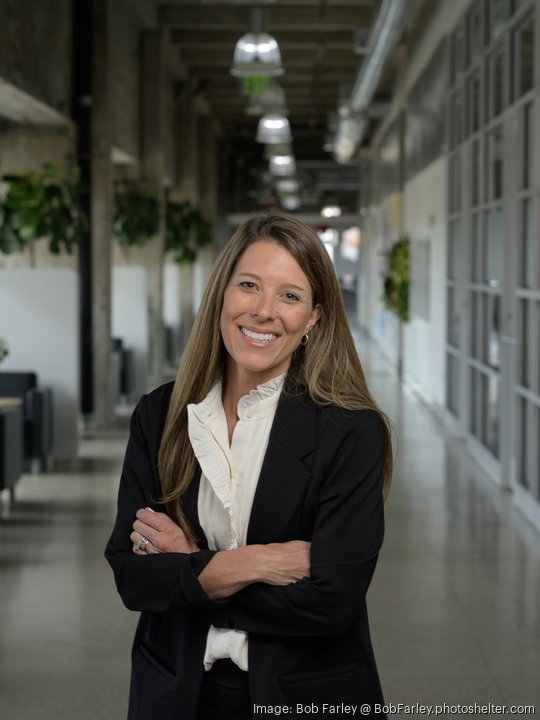
2022- Brooke Gillis becomes CEO
